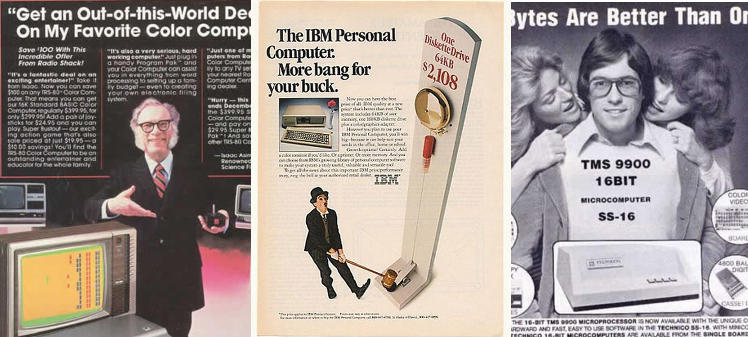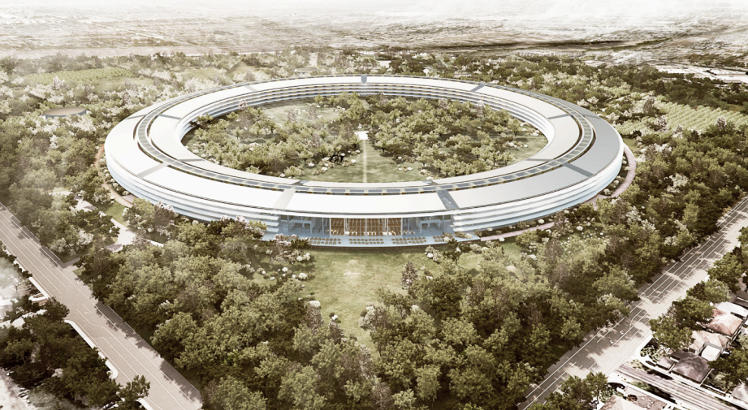The world is breaking up.
It’s something that’s happened plenty of times in the past. Religions. Nations. Idealogies. Systems of government. All of these have been catalysts for massive division on a global scale. Unfortunately, the age of empires hasn’t passed. It’s simply shifted from kings, queens, religions and lines in the sand to a whole bunch of tech companies.
Apple is one. Google is another. Yahoo is trying. Samsung and Microsoft are trying harder.
Now this particular division has been happening for some time now – for over a decade, in fact – but it’s only now that critical mass is being reached and the cat’s starting to peek out of the bag.
A House of Cards
To truly comprehend what’s happening today, we need to look back to the personal computer market of the early 80’s.
It was a time of great change. IBM has just released the IBM-PC, throwing their personal computer into a battleground of many companies. Each manufacturer produced its own computer with its own chip design. Northstar, Hewlett-Packard, Tandy, Olivetti, Commodore – each of these computers were fundamental different. Software had to be written differently for each of them. There was little to no compatibility between the platforms. Each company, in short, ran its own pseudo-ecosystem.
IBM destroyed this structure. They were large and powerful enough to make their IBM-PC an open standard rather than a closed system. Anyone could make an IBM-compatible PC: the design was out there.

That prompted software people to write more software for IBM-PCs, hardware people to build more hardware for IBM-PCs, and users to buy IBM-compatible-PCs – because suddenly, there was the guarantee that you’d have software and hardware to work with and that anything that ran on your system could also run on your friends’. It helped that the ever-popular DOS was available for the IBM-PC.
This became so successful that IBM effectively lost control of their own creation. PC Magazine commented in 1985 “backward compatibility [with the IBM PC] is the single largest concern of hardware and software developers. The user community is too large and demanding to accept radical changes or abandon solutions that have worked in the past.”
The spread of the IBM-PC contributed to the rise of a new juggernaut – Microsoft. Microsoft successfully built one of the most successful software platforms of all time and backed it up with a range of massively successful software like Office – but they stayed out of hardware.
One company survived: Apple.*
The Vatican of our Times

Everybody knows the story of Apple: they went through a furnace mostly comprised of Steve Jobs and emerged with beautiful products that worked well. For ages, they refused to buy into the PC, as people were now calling it. They insisted on producing their own hardware, their own software and, in essence, their own user experience.
They not only replicated this success with the iPod and the iPhone, they capitalized on it. By marrying both software and hardware, they created a more or less unified experience across their entire platform (the App Store and Airdrop are excellent examples). Their products inspired a cult-like following that many people ridiculed.
Apple did not lock people entirely out of the ecosystem – there’s nothing to stop a Windows user owning an iPhone – but by and large, they made sure Apple products provided a much better experience when used with other Apple products. The iPhone’s success was followed by that of the Macbook Air, which spawned an entire category of laptops all on its own.
Funnily enough, this approach was mocked by many as being ridiculously closed until another company came along and replicated this success. That company was Google.
They did it with Android – to the point where an Android device that doesn’t sync to Google’s Play services feels like a lobotomized dumbphone.
Now they’re tightening the noose. The most used browser in the world, Chromebooks, the utter dominance of search, Maps, even an iffy foray into social networking, an increased pressure on smartphone manufacturers to confirm to certain Google-defined user experience standards, a rabid fan following, a whole ton of cross-platform integration – yup, they’re getting there.

While neither of these companies are fully closed, the quality of the services that they offer high enough, and the resources they bring to bear, are so massive that most competitors simply fall off the train. Take Google Search, which was so successful the word “Google” is now a dictionary entry meaning “to search the Internet”. Take Gmail, which every Tom, Dick and Kotalawala uses. Take the smartwatches rolling in, all tied to the Android ecosystem.
Then of course, there’s Microsoft. Microsoft has gone from OSes to a very successful console (the Xbox, anyone) cloud services to consumer-focused FOC cloud services to – er, their own tightly controlled smartphone ecosystem to tablet-laptop hybrids to most of Google’s most visible services. Mind you, they’re not succeeding as dynamically as Google or Apple, because Microsoft tends to get hooked on the wrong thing – Bing, IE and the disastrous Metro interface are good examples. Nevertheless, as often as they fall flat, I can’t help but notice that the world still runs on Microsoft products.

Take my work, for example. I write this on a custom-built rig using Microsoft Word running on a Microsoft operating system. I’m a heavy user of Google products and services – I carry my Chromebook everywhere, our team collaborates largely through Google Drive, and even our work email resides on Gmail. Nevertheless, at the end of the day, most of us head back to our Windows-based PCs and laptops.
These are the religions of our times. For most of us who are connected to their tech-heavy world, the old gods are almost gone. In their place are these new, even more pervasive gods. They decide how the information we want is presented to us. They connect us to other people. They live in our pockets, homes, offices. They redefine how we approach our personal lives and our work. They’re everywhere and they are everything.
The Bit Players
In our frenzy to acknowledge the visible, though, we’re overlooking some other players around. Take Amazon. Amazon went from e-commerce to creating the Kindle (spawning the most successful eBook market in the process) …and didn’t stop. They have a massive cloud operation running. They did a tab (the Kindle HDX). They did their own version of Android. They did a smartphone.

Then there’s Samsung, who tried once to establish a mobile ecosystem in addition to the massive hardware presence they have on the global market (remember the Wave and Bada?). That failed, but now they’re trying to come back with the likes of Tizen and Galaxy Gear. Heck, take Valve: a company that makes games also operates the world’s largest digital game distribution platform (making millions in the process) and is building their own Steam OS entertainment machines for the living room.
The Business of Religion

All of these companies have a few things in common. They’re large. When they can’t do something, they acquire someone who can. Apple acquired Beats. Google’s snapping up Silicon Valley tech at a massive rate – including aerospace companies. They operate in a space that spends millions to make billions. They’re effectively running their own religions – with missionaries that speak not of salvation but of gigahertz, the number of apps available and what’s hot in the latest update.
As they grow larger, the world is inevitably headed back through the pages of history, back out of an open network of products and services into a landscape where a handful of giant electronic ecosystems do battle. It’s not quite there yet. It’s getting there.
The current ecosystems intersect and bleed into each other at places where their offerings are below the standard – and given how diverse they are, this happens a lot. But what happens if Google Docs becomes as good as MS Word, Microsoft’s Windows Phone platform becomes as viable as an Android smartphone and Apple’s newest phones start sporting custom Apple sockets for headphones and connectivity?
Then it’s a matter of choosing your faith.
*Acorn also survived, popularizing the ARM architecture that would come to dominate the smartphone space.







GIPHY App Key not set. Please check settings